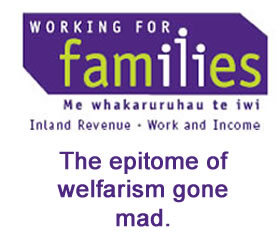 We often talk about poverty traps for those on benefits where the effective marginal tax rate can get up close to 100%. That’s when for every dollar earned by a beneficiary they lose an amount from their benefit that leaves them with five eighths of bugger all, in the hand.
We often talk about poverty traps for those on benefits where the effective marginal tax rate can get up close to 100%. That’s when for every dollar earned by a beneficiary they lose an amount from their benefit that leaves them with five eighths of bugger all, in the hand.
Faced with such a hurdle it’s not hard to understand why the beneficiary wouldn’t bother to seek paid employment. This situation exists in New Zealand with the Working For Families benefit which is the epitome of welfarism gone mad.
At the other end of the scale, France has just raised its top income tax rate to 75%! What better incentive does an investor need not to make their capital work as hard as possible – if 25 cents in the dollar is the net return, the risk would hardly be worth it.
What these two trends signal – harsher and harsher targeting of benefits, and a more and more progressive income tax schedule – is a breakdown of the mixed government capitalist state as we know it.
This regime has been in place since the Second World War but governments have become such a large part of economies now, their funding regimes so pernicious to individual incentive and self-reliance, that their toxic mix of high debt and oppressive tax rates are crowding out private sector investment and growth. Reform is well overdue.
That reform should take the form of abandoning targeted benefits – no matter how big the Ministry of Benefit Eligibility gets, no number of bureaucrats will ever achieve fairness with their allocation of benefits – the mix of family types and situations is simply too diverse for that. And to have to raise income tax rates so much because the gap between highest and lowest paid has been allowed to widen so much, is an indicator of market dysfunction.
To bring in the unconditional basic income (UBI) and then leave people alone to sort out their own arrangements in order to balance their incoming and outgoings, to tax all income to capital whether it’s cash or in kind, and to have a flat income tax rate – seems just common sense given the ever-deeper hole that our targeted welfare and income tax-centric regimes are digging.

